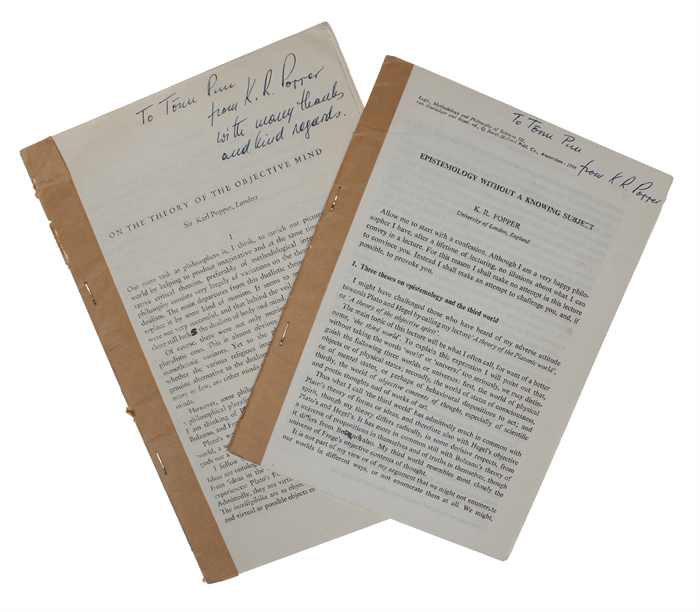POPPER'S "THIRD WORLD" - SIGNED PRESENTATION-COPIES
POPPER, K.R.
Epistemology Without Knowing a Subject. [From: Logic, Methodology and Philosophy of Sciences III] + On the Theory of the Objective Mind. [From: Logic, Methodology and Philosophy of Sciences III]. (Pasted in printed note at the bottom of last page: A Lecture delivered (in an abbreviated version) on 3 september 1968 in Vienna. Reproduced from Akten des XIV. Internationalen Kongresses für Philosophie, vol. I, Vienna 1968).
Amsterdam, 1968 + (Vienna, 1968).
Both 8vo. Both unbound and stapled with brown paper-backstrip. "Epistemology...": nice and clean copy. Pp. (333)-373. "On the Theory...": backstrip a bit torn, otherwise a nice and clean copy. Printed on rectos only. Pp. (25)-53.
Both works being in the scarce original re-prints of proof-prints (with the original corrections reproduced), both with signed presentation-inscription on top of first page to Tönu Puu [the first reading: "To Tönu Puu / from K. R. Popper.", the second: : "To Tönu Puu / from K. R. Popper / with many thanks / and kind regards."]. of Popper's important works on "the third world", which together forms his "Popperian Cosmology", focusing on the "third world", namely the body of human knowledge expressed in its manifold forms.
Tönu Puu is Professor of Economics at the University of Umeå in Sweden. In 1967 Puu published "Some Reflections on the Relation between Economic Theory and Economic Reality", which caught Popper's attention - and to such an extent that he cited it.
The two present works constitute the main contributions to what is known as Popperian cosmology, in which Popper divides the world into three parts.
"EPISTEMOLOGY WITHOUT A KNOWING SUBJECT" explores the third world.
"The main topic of this lecture will be what I often call, for want of a better name, "the third world". To explain this expression I will point out that, without taking the word "world" or "universe" too seriously, we may distinguish the following three worlds or universes; first, the world of physical objects or of physical states; secondly, the world of states of consciousness, or of mental states [...]; and thirdly the world of objective contents of thought, especially of scientific and poetic thoughts and of works of art.
Thus what I call "the third world" has admittedly much in common with Plato's theory of forms or ideas, and therefore also with Hegel's objective spirit, though my theory differs radically, in some decisive respects. It has more in common still with Bolzano's theory of a universe of propositions in themselves and of truth in themselves, though it differs from Bolzano's also. My third world resembles most closely the universe of Frege's objective contents of thought." (Popper, Karl. Epistemology Without a Knowing Subject, pp. (333)).
"In "Epistemology Without a Knowing Subject" Popper offers a "biological" argument for doubting that minds and bodies exhaust all the entities inhabiting the human world. Not only is man a conscious animal, he is also a being whose communicative capacity has evolved to the point of being able to describe and criticize his encounters with the world" (Fuller, Steve. Social Epistemology, Indiana University Press, 1988, p. 51).
In "ON THE THEORY OF THE OBJECTIVE MIND", "the matter at issue is not, as Descartes, the knowledge of particular subjects but a knowledge that is independent of particular subjects, that is, intersubjective. [It] has much in common with "Plato´s theory of Forms and Ideas" and "Hegel´s objective spirit". (Keuth, Herbert. The philosophy of Karl Popper, Cambridge University Press, 2004, p. 294).
"To sum up, I have tried to show that the idea of the third world is of interest for a theory of understanding which aims at combining an intuitive understanding of reality with the objectivity of rational criticism", (Popper, Karl. On the Theory of the Objective Mind, p. 47).
Karl Popper still exercises extensive influence on a variety of different thinkers, scholars and economists. The billionaire investor George Soros claims that his investment strategies are modeled upon Popper's understanding of the advancement of knowledge through the distinctly Hegelian idea of falsification.
Order-nr.: 45790


![Epistemology Without Knowing a Subject. [From: Logic, Methodology and Philosophy of Sciences III] + On the Theory of the Objective Mind. [From: Logic, Methodology and Philosophy of Sciences III]. (Pasted in printed note at the bottom of last page: A L...](/images/product/45790b.jpg)